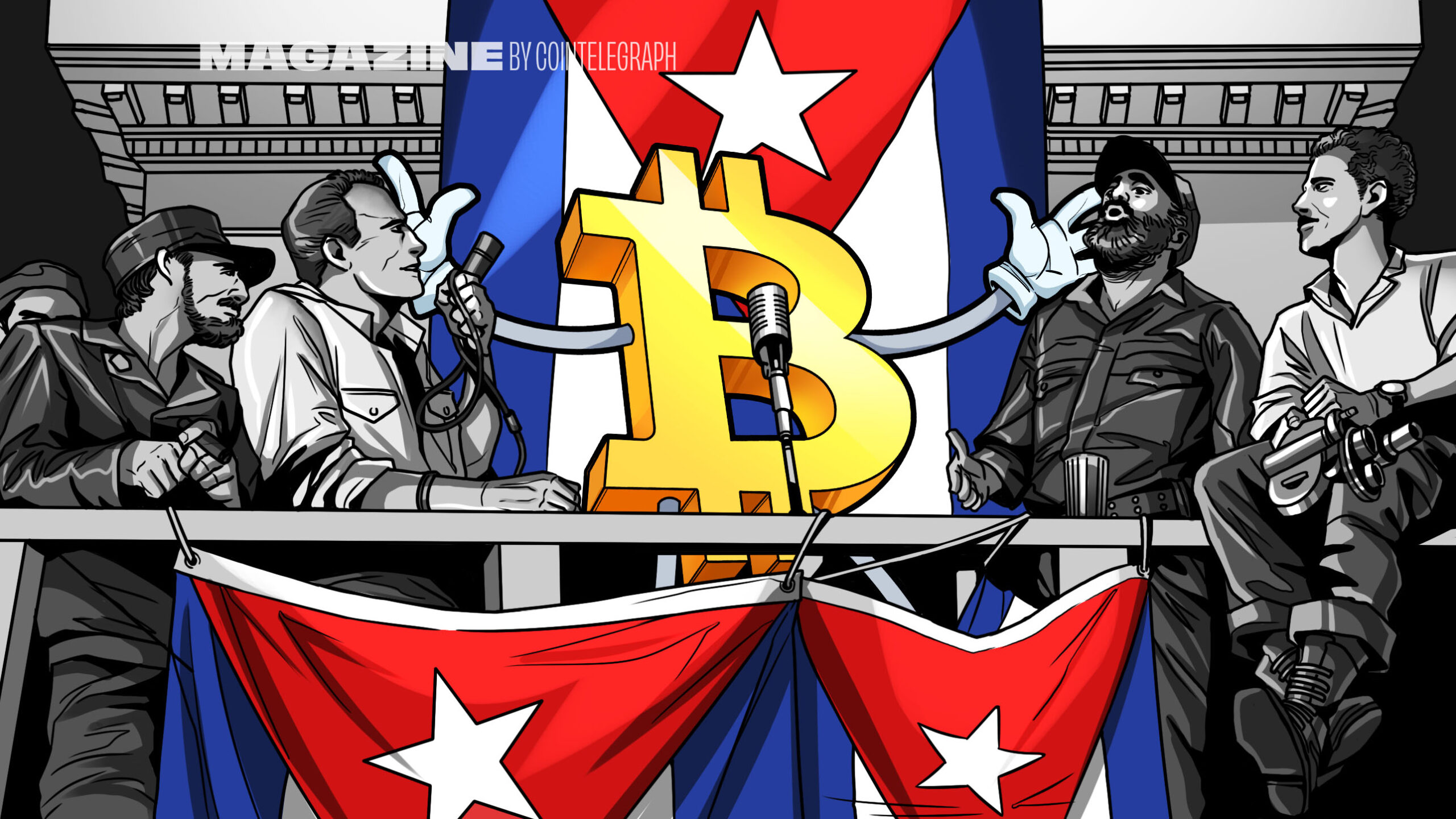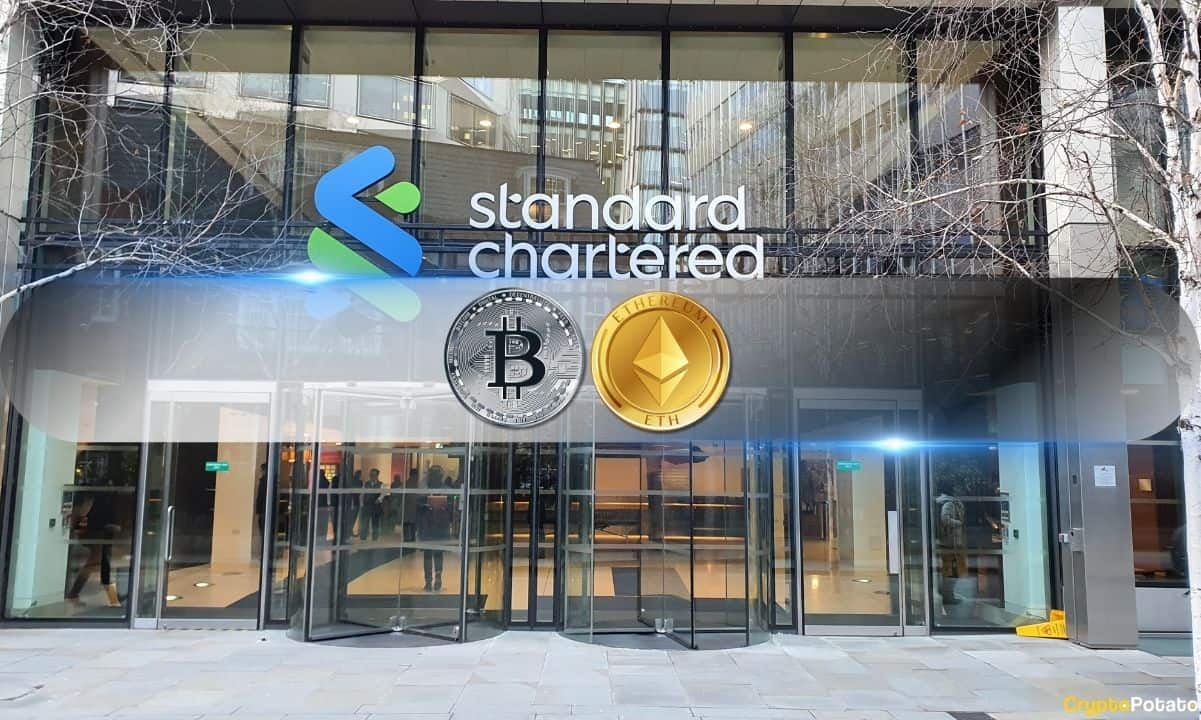Cryptocurrency
The Truth Behind Cuba’s Bitcoin Revolution: An on-the-ground report

In Cuba’s capital, Havana, a Bitcoin community has emerged from an economically antagonistic environment.
“Satoshi didn’t create Bitcoin for Cubans, but it really comes in handy for us,” Forte, co-founder of the aptly named local Bitcoin organization Cuba Bitcoin, tells Magazine.
Cubans are turning to Bitcoin because their money is increasingly worthless. Zimbabwe, Venezuela and Lebanon often compete for media coverage about runaway inflation levels, but the Cuban peso is not far behind.
The Cuban peso has devalued so much over the last few years that carrying bags of cash is increasingly common among the rich and the poor.
In practice, even if someone bought Bitcoin at the top of the 2021 bull run at $69,000, their money is worth much less in Cuban pesos. Whereas Bitcoin dropped 80% to its bear market low, it has since recovered 100%, and the peso has devalued by 90%.
The realization that someone should swap local currency for the Bitcoin top, knowing that it will crash and they’ll still retain more purchasing power, is one of the many financial wake-up calls received while working on Cointelegraph’s new documentary, The Truth Behind Cuba’s Bitcoin Revolution.
In 2021, I came across the article “Inside Cuba’s Bitcoin Revolution” by Human Rights Foundation chief strategy officer Alex Gladstein, in which he explains how and why Cubans were utilizing Bitcoin’s stateless and low-fee properties to save money and escape financial oppression.
In line with the Bitcoin mantra of Don’t trust, Verify, I went to see with my own eyes what Gladstein described.
Camera in hand with my trusty travel partner Paco de la India by my side, I network my way into the Cuba Bitcoin community, which now counts thousands of enthusiasts and advocates.
La Cultura Cubana
Following one of the largest financial conferences in the world, Bitcoin Miami, in arguably the world’s most capitalist arena, the United States of America, I hop across the Caribbean to Cuba, one of the few extant socialist states. The contrast hits me harder than the Cuban tropical heat.
From the moment I landed at Havana Jose Marti International Airport, I noticed some funny quirks: doors open manually (forget automatic sensors), check-in and immigration are done on pen and paper, and the taxis are 1950s Chevrolets.

It’s common to describe visiting Cuba as a time warp. It’s not hyperbole; Cuba cannot access world markets, financial institutions or trade. The United States has subjected Cuba to a trade embargo — the longest in modern history — since the island nation nationalized U.S. oil refineries in 1960.
As a result, Cuban industry, economic output and commerce lag far behind the modern world.
The embargo, coupled with more than half a century of communism, has resulted in a highly educated, extraordinarily literate but desperately poor and hungry population, many of whom possess a heartbreaking desire to leave the island, or in Spanish, to find a “salida” — an exit.
Why stay in a country where a taxi driver earns more than an atomic engineer — and the emaciated engineer struggles to feed their family?
Adopting Bitcoin
In such an environment, it’s a wonder why Cubas don’t flock to Bitcoin as money that exists outside of state control. However, many Cubans are learning about and slowly turning to Bitcoin.
Catrya, one of the main characters in Cointelegraph’s new documentary and one of the founders of Cuba Bitcoin, explains that there could be around 5,000 Bitcoiners in Cuba, and if you include crypto enthusiasts generally, the number is higher still.
Cubans do not have easy on-ramps into crypto. Firstly, those with internet connections cannot sign up for Binance, Coinbase or Gemini due to their nationality. For Cuban Americans on the island, Cuba’s government restricts access to American websites. Cubans buy Bitcoin peer-to-peer through Telegram or WhatsApp groups and at in-person meetups.
What amazes me is the tiny amounts of money Cubans put aside to save money or “stack sats.” Saving 1,000 satoshis (less than $1 a week) is meaningful to a Cuban on $40 monthly. The Cuban peso may not be here in 10 years, but Bitcoin certainly will be.
The peer-to-peer process is straightforward, but it’s not beginner-friendly, and these hurdles can hamper adoption — although they do have a silver lining, as Catrya explains:
“Since we’re denied [access to exchanges] by default for being Cuban, we can never do KYC [Know Your Customer], so that’s a good thing for us, at least in terms of privacy.”
Buying Bitcoin peer-to-peer and storing Bitcoin by taking ownership of the private keys is safer. Customers who trusted custodians such as FTX, BlockFi, Celsius and Vauld with their crypto were wiped out. Cubans don’t have that option, and while it takes longer, it’s more secure.

Erich Garcia Cruz, the founder of QvaPay and BitRemesas — a currency remitter using Bitcoin that boasts tens of thousands of Cuban users — says that the small but growing number of Bitcoin customers somewhat represents Cuba’s fledgling internet culture.
Connectivity and freedom of information
Cubans could get online in earnest from 2013. So, while the rest of the world was enjoying the iPhone 5C and 4G, a few lucky Cubans fortunate to access a computer could get online that year, albeit with an awful internet connection.
Now, Cubans can access 3G and sometimes 4G connectivity on their phones. The tech-savvy and younger Cubans use VPNs to circumnavigate online restrictions.
Generally, the lag in internet infrastructure combined with the cost and difficulty of buying a smartphone on a frighteningly low salary means Cuba is way behind in IT.
In 2021, the World Bank reported that three-quarters of Cuba has access to the internet. But while the issue is improving, internet censorship is rife, and Cubans are repeatedly told to trust the government through state-sponsored TV, newspapers and media.
Independent media publications are classified as “enemy propaganda,” which is something I was made aware of a few times during my investigation. I won’t share those stories here, but it’s safe to say reciting such stories would’ve landed me in trouble had I stayed in Cuba.
Two exiled Cuban journalists have since advised me to avoid returning to the island for some time, especially if the Cointelegraph documentary gets a lot of attention.
A funny caveat to the state-run media is that some Cubans were orange-pilled by Bitcoin proponent Max Keiser. His appearances on the Russia Today news channel were approved for broadcast in Cuba. Some of Catrya’s peers watched the show where Keiser bashes fiat currencies and promotes Bitcoin.
And yet, Bitcoin is magic internet money; it lives on the web. If Cubans aren’t online — or watching Russia Today — how can they know about it?
Orange pill Cuba
Bitalion, one of the Cuba Bitcoin founders, works in telecommunications for the government. He explains that as a privileged public sector worker, he benefits from better internet connection speeds and lower online censorship levels.

Bitalion stumbled across the Bitcoin white paper in 2014 and became infatuated with the idea of an independent, borderless currency. He rhetorically poses the question: For those fortunate Cubans who are able to travel abroad, what can they bring to the new country? The peso in their pocket, or Bitcoin in a mobile wallet?
As with the other Bitcoin advocates on the island, Bitalion volunteers his time to educate people and support Bitcoin adoption. He’s also one of the handful of Cubans running a Bitcoin node. At Cuba’s first-ever Bitcoin-only meetup, he demonstrates to dozens of Cubans how to pay for goods and services directly to his Lightning Network node.
Cruz, Forte and countless business owners explain that Bitcoin is an easy “orange pill” to swallow, particularly for the digitally capable Cubans. You merely explain to them that nobody controls it; it’s stateless money.

At face value, Bitcoin is a useful tool for a country that has been financially and economically handicapped for generations. But for Forte, Catrya and Bitalion, the ideology of Bitcoin resonates strongly.
Forte jokes, “Satoshi didn’t create Bitcoin for Cubans, but it really comes in handy for us.”
In the hope of encouraging more Cubans to explore Bitcoin, the trio and the Cuba Bitcoin community host monthly educational meetups in which they explain the principles of Bitcoin and delve into its philosophy.
They recently introduced the popular Mi Primer Bitcoin (My First Bitcoin) program in the country, which is already picking up speed in El Salvador and will soon be instructed in schools nationwide.
Por qué aceptas Bitcoin? Why do you accept Bitcoin?
QvaPay’s Cruz explains that Bitcoin is the financial tool that allows the small but growing number of Cuban business owners to access foreign products.
Recent U.S. presidential administrations had fluctuating policies on the Cuban embargo, relaxing and tightening different aspects based on political expediency.
Cruz orange-pills suppliers in an attempt to open up the Cuban economy to international markets where possible:
“You are accepting Bitcoin because you’re dealing with a private [independent] coin. The government doesn’t have access to the transactions you and you have the freedom to do whatever you want.”
The term “freedom,” or “libertad,” popped up frequently as I mingled and met with Cuban Bitcoiners, crypto enthusiasts and entrepreneurs. The fact that citizens can hold money in a wallet, outside of government overreach, appealed to many Cubans whom the government has consistently let down.
The ability to store wealth on a mobile phone in a Bitcoin Lightning wallet instead of in pesos at a bank is also an efficiency gain. It means no more queues at banks to cash in money that could devalue by a few pesos over a bank holiday weekend.

Cruz and three other business owners also share that accepting Bitcoin benefits holidaymakers. Adan, a nightclub, bar and restaurant owner, explains that tourists bring a lot of cash to Cuba for vacation — and that’s risky.
Having Bitcoin on a mobile phone in a wallet is a safer way to travel than flashing wads of dollar bills that end up on the black market in Cuba, inadvertently supporting the illicit and sometimes dangerous black market activity of exchanging notes in public.
Adan accepts Bitcoin because of the international branding the Bitcoin logo brings. It opens up his bars’ doors to another potential market. Similar to El Salvador, where Bitcoin tourism has become a trend, bars and restaurants in Cuba could also attract holidaymakers to spend satoshis instead of pesos at the till.
Finally, there are myriad ways in which adopting Bitcoin can lead to positive and unexpected outcomes. Mister Navi’s bar and restaurant, run by Mr. Navi and his son Julian, recently began accepting Bitcoin. Following a conversation with Forte, Catrya and Bitalion, the Cuba Bitcoin group now hosts educational Bitcoin meetups at the venue.

I tipped one of the service staff in Bitcoin at Mr. Navi’s the first day we visited. Five days later, I saw her again when we went out for dinner with Mr. Navi and Julian. She seems different — I ask her if she is OK. She confesses that she was mugged a few days ago, and the attacker stole her purse, cash and phone.
To her surprise, when she downloaded the Bitcoin Lightning app where I’d tipped her, the funds magically reappeared on her new phone. On seeing her wide-eyed reaction, I tipped her again.
It’s clear that, for Cubans, Bitcoin could represent a critical instrument for securing their financial future in the face of runaway inflation and government interference, or as a way of opening up to embargoed markets and the international financial world.
Disclaimer: The views, opinions and perspectives expressed in this article are those of the author and are not necessarily those of Cointelegraph.
Cryptocurrency
Standard Chartered Launches Institutional Spot BTC, ETH Trading

Standard Chartered has become the first internationally recognized financial heavyweight to launch direct spot trading for Bitcoin and Ethereum.
The offering positions the UK-based institution at the forefront of regulated digital asset integration within traditional finance.
Launch Mechanics and Client Access
According to reports, the new service will allow institutional clients, including asset managers, corporations, and large investors, to trade BTC and ETH directly using FX trading interfaces established by the bank.
Standard Chartered stressed that the trades are “deliverable,” meaning that customers will receive actual crypto assets upon settlement rather than mere exposure via derivatives. Additionally, users can choose their own custodian, including Standard Chartered’s in-house service.
At first, the offering will be available during Asian and European trading hours, with potential demand determining whether there will be 24/5 access in the future.
The bank also plans to introduce non-deliverable forwards (NDFs) trading for the two largest crypto assets by market cap. This will further expand risk management tools amid growing institutional appetite for digital assets.
Traditional banks are under increasing pressure to bridge the gap between legacy finance and crypto infrastructure, and Standard Chartered hopes to eliminate a major point of friction for institutional players who were previously forced to navigate a fragmented and often unregulated crypto sector.
A Broader Crypto Strategy
The UK spot trading launch is just one piece of Standard Chartered’s growing arsenal of digital asset solutions. At the beginning of the year, the bank established a dedicated Luxembourg entity to offer regulated crypto custody services within the EU.
Around the same time, it also dipped its feet into stablecoins and tokenization, partnering with Animoca Brands and HKT to develop a Hong Kong dollar-pegged stablecoin.
Compteitors like JPMorgan and Goldman Sachs have taken a more conservative approach to direct crypto spot trading, with Nate Geraci, co-founder of The ETF Institute, decrying this cautious stance.
Recently, while referencing Vanguard, another heavyweight player in the financial management space, he suggested that the refusal by such institutions to offer crypto products could alienate investors seeking exposure to such assets.
“What Vanguard is missing (*huge* miss IMO)…” Geraci posted. “Is there are tons of investors who love Vanguard’s low cost approach to stock & bond investing AND they want to own some btc & crypto.”
Meanwhile, Standard Chartered Group CEO Bill Winters has consistently stated that “digital assets are here to stay.” The company’s aggressive positioning grants it an early-mover advantage in a market where deep-pocketed investors are increasingly demanding secure, compliant crypto exposure amid a shifting regulatory environment and rising BTC adoption.
Binance Free $600 (CryptoPotato Exclusive): Use this link to register a new account and receive $600 exclusive welcome offer on Binance (full details).
LIMITED OFFER for CryptoPotato readers at Bybit: Use this link to register and open a $500 FREE position on any coin!
Cryptocurrency
Is Solana About to Explode Further? Analyst Reveals Next Targets

TL;DR
- Solana breaks above $166 Fibonacci level, with bulls eyeing targets at $171, $179, and $185.
- SOL trades above 9-day SMA, while MFI at 76 signals strong inflows but potential exhaustion.
- SEC ETF reviews add momentum to Solana’s ongoing upward price action.
SOL Chart Points to Bullish Target
Solana (SOL) has broken out of an ascending triangle. The price cleared the $166 mark, which is the 1.272 Fibonacci level. Traders now watch for the next levels at $171, $179, and $185. The structure shows rising lows and growing volume, which supports the move.
“This could be the cleanest breakout I’ve seen all month,” said analyst Ali on X.
If buyers stay in control, the $185 level may be next. But traders also watch for pullbacks, especially as prices move higher into resistance zones.
This could be the cleanest breakout I’ve seen all month! pic.twitter.com/FGWTYaOqDg
— Ali (@ali_charts) July 15, 2025
SMA and MFI Indicate Bullish Momentum
Solana trades above its 9-day simple moving average, which now sits at $158. This shows that buyers are still active. The slope of the line is pointing up, which supports the current direction.
At the same time, the Money Flow Index is at 76.16, which is close to the overbought line. This reading shows that funds have flowed in fast. But it also warns of possible profit-taking or price pauses near this level.
Network Use and ETF Talk Support Momentum
As CryptoPotato reported, the number of active users on Solana’s network has recently ticked up. This rise in activity often helps price moves stay strong. The added use shows interest in Solana is growing.
Meanwhile, the SEC is now reviewing spot ETF filings tied to Solana. These efforts are said to be moving quickly. If approved, they may open more ways for funds to buy SOL directly.
Binance Free $600 (CryptoPotato Exclusive): Use this link to register a new account and receive $600 exclusive welcome offer on Binance (full details).
LIMITED OFFER for CryptoPotato readers at Bybit: Use this link to register and open a $500 FREE position on any coin!
Cryptocurrency
Large Bitcoin Investors Realize $1.54 Billion in Profits but Rally Still Intact: CryptoQuant

Bitcoin’s climb above the coveted $120,000 level was short-lived, as the cryptocurrency pulled back to below $117,000 amidst renewed volatility. Over the past 24 hours, it declined by over 4%.
On-chain signals reveal increased miner activity, which suggests short-term selling pressure.
Miners Cashing Out?
As the price approached new highs, the Miners’ Position Index (MPI) – which gauges the ratio of miner outflows to their one-year moving average – spiked to levels last seen during major sell-off periods. This means that some of them may have begun taking profits into strength, a pattern often seen when the MPI reading rises above 2, hinting at larger-than-usual Bitcoin outflows from miners to exchanges.
While such moves can introduce short-term selling pressure, CryptoQuant explained that historical patterns indicate they do not always derail broader bullish trends when demand from other investor cohorts remains strong.
At the same time, Binance, the world’s largest cryptocurrency exchange, recorded net inflows of nearly 6,000 BTC between July 12 and July 14. This activity reversed a period of predominantly neutral or negative netflows. The sudden influx alongside the recent price rally points to potential arbitrage activity, derivative hedging, or preparations for large-scale transactions rather than outright panic selling.
Considering all these factors together, the uptick in miner activity and increased exchange deposits mean that while some market participants are realizing gains, others may be positioning for continued price action.
Amid these miner outflows and Binance inflows, Glassnode recorded one of the year’s largest profit-taking days.
Bitcoin Logs One of Its Largest Profit-Taking Days
According to the blockchain intelligence platform’s findings, Bitcoin investors collectively realized $3.5 billion in profits over the past 24 hours.
This is one of the largest profit-taking days for BTC this year. Interestingly, long-term holders accounted for approximately $1.96 billion, or 56% of the realized gains, while short-term holders captured around $1.54 billion and accounted for the rest.
The significant wave of profit realization, led predominantly by long-term holders, demonstrated how seasoned investors are seizing the opportunity to lock in gains as Bitcoin hit a fresh peak while still allowing room for fresh capital to enter.
Binance Free $600 (CryptoPotato Exclusive): Use this link to register a new account and receive $600 exclusive welcome offer on Binance (full details).
LIMITED OFFER for CryptoPotato readers at Bybit: Use this link to register and open a $500 FREE position on any coin!

 Forex3 years ago
Forex3 years agoForex Today: the dollar is gaining strength amid gloomy sentiment at the start of the Fed’s week

 Forex3 years ago
Forex3 years agoUnbiased review of Pocket Option broker

 Forex3 years ago
Forex3 years agoDollar to pound sterling exchange rate today: Pound plummeted to its lowest since 1985

 Forex3 years ago
Forex3 years agoHow is the Australian dollar doing today?

 Cryptocurrency3 years ago
Cryptocurrency3 years agoWhat happened in the crypto market – current events today

 World3 years ago
World3 years agoWhy are modern video games an art form?

 Commodities3 years ago
Commodities3 years agoCopper continues to fall in price on expectations of lower demand in China

 Economy3 years ago
Economy3 years agoCrude oil tankers double in price due to EU anti-Russian sanctions
























